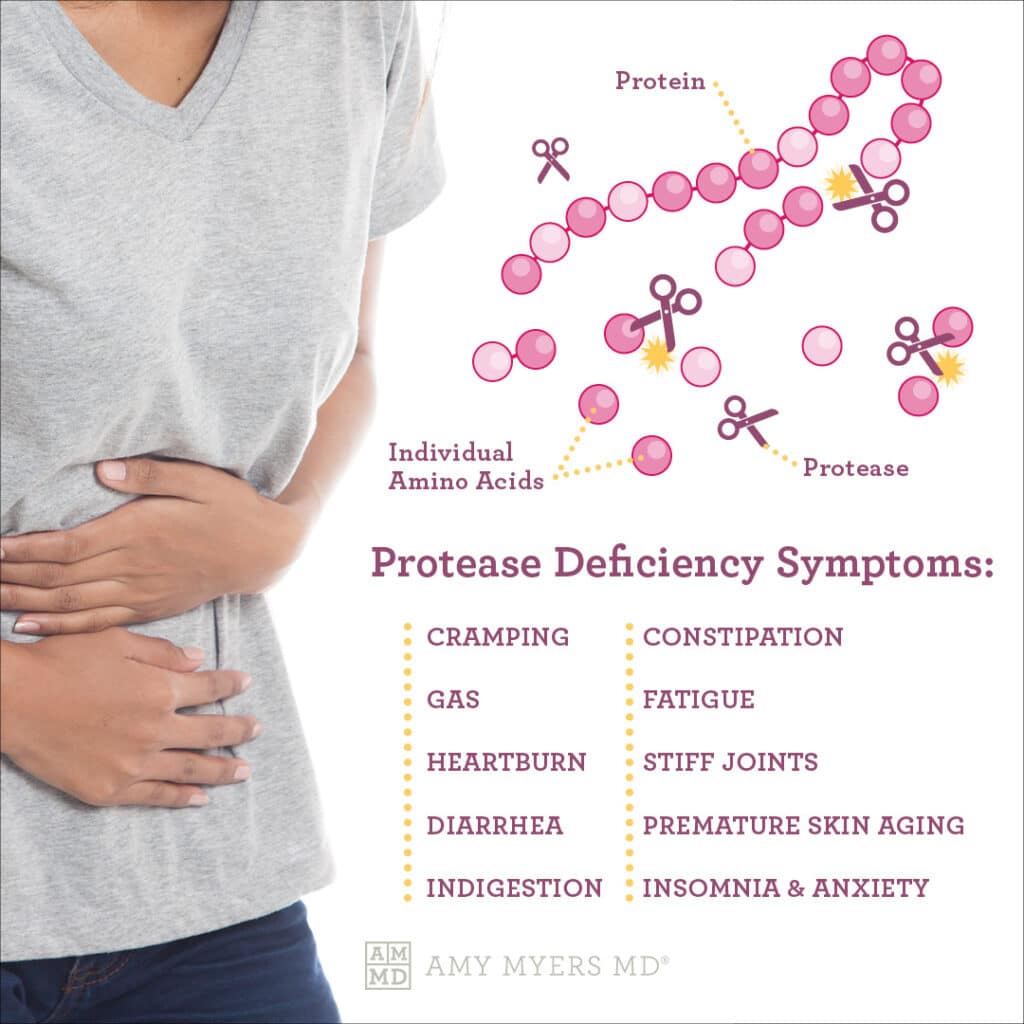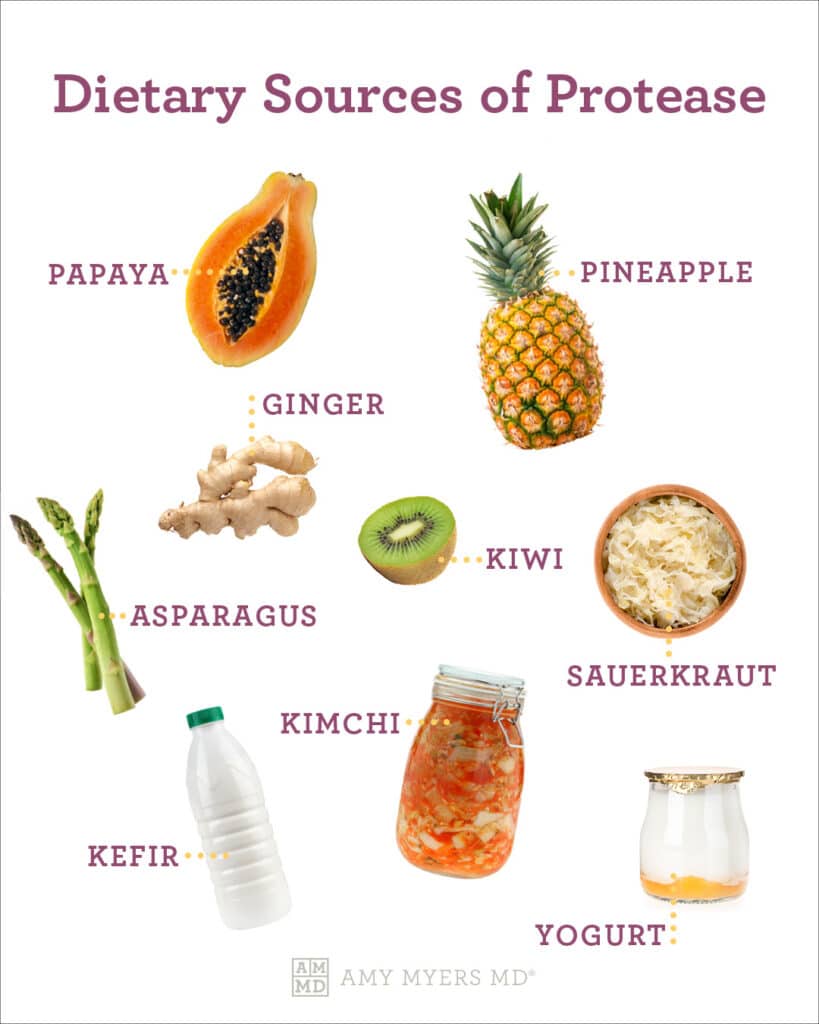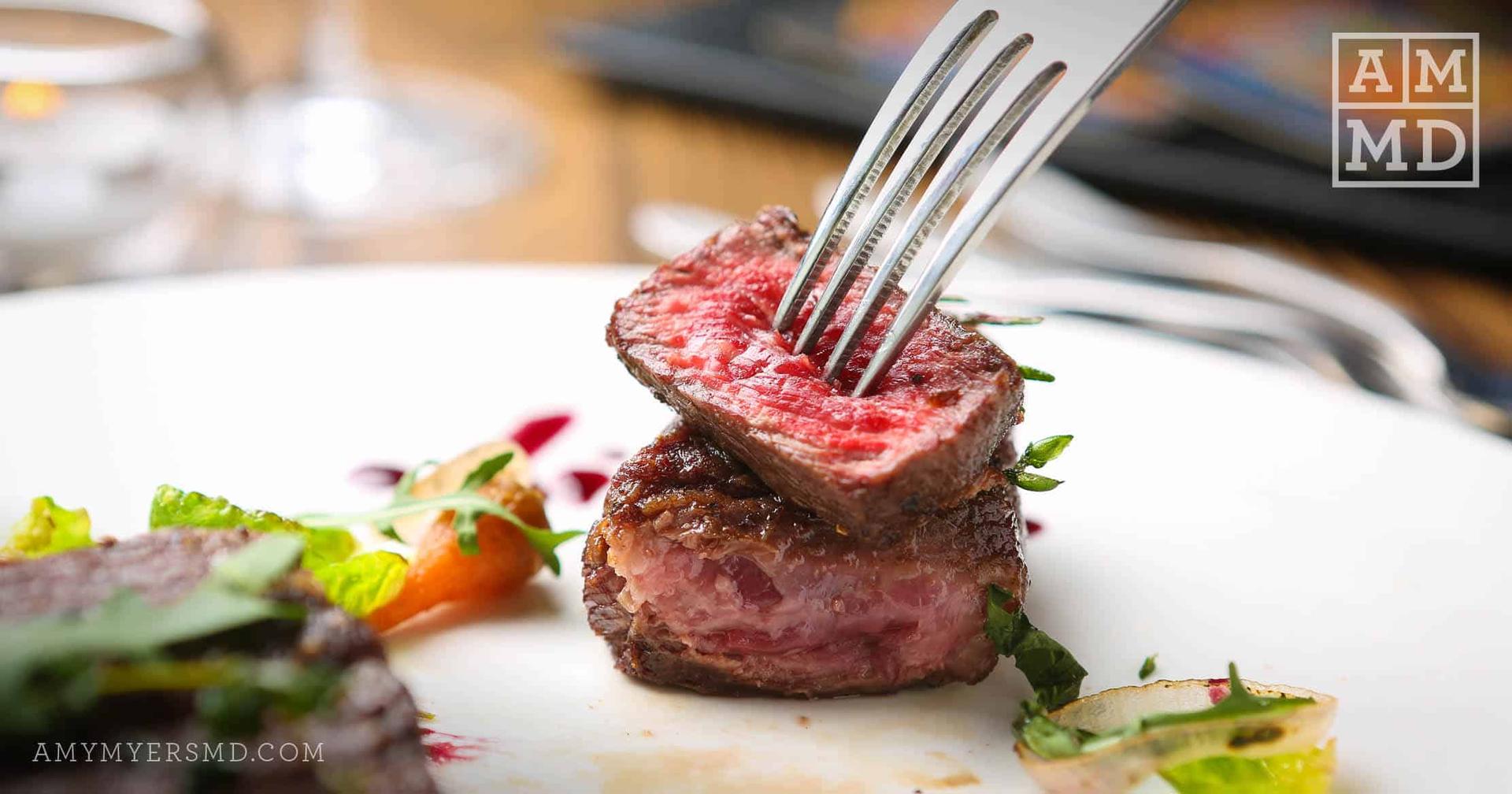The phrase “you are what you eat” has one caveat. You could eat nutrient-rich whole foods daily, yet you might not absorb all the nutrients. I believe the phrase should be, “you are what you digest and absorb.” Digestive enzymes help break down our food into their building blocks, including protein. Yet, do you know what enzymes aid in protein digestion?
Your body produces hundreds of enzymes that break down food into building block components, such as amino acids, fatty acids, maltose, and glucose. Amino acids are the building blocks of protein, so it’s essential to have the enzyme that aids in the digestion of protein. The issue is that our body can stop producing certain digestive enzymes as we age due to our diet, lifestyles, and autoimmunity. The lack of enzymes makes it difficult to absorb the nutrients from food.
I will tell you about digestive enzymes, the protein digestion enzyme, and how you can support the process of nutrient absorption by providing your body with these essential enzymes. Let’s start with revving the digestion process.
Digestion is a four-stage process – ingestion, digestion, absorption, and elimination. It’s the same four steps regardless of what you are eating. For this example, I’m going to be talking about protein digestion.
The first step is ingesting the food. This process can begin when you smell a steak cooking on the grill, and your mouth begins to produce saliva. However, it commonly starts when the food enters your mouth. Saliva contains the enzyme amylase, which breaks down gluten into maltose. I’ll talk more about the different enzymes in just a bit.
The next step is digestion, which is the chemical and physical breakdown of your food. This also triggers the release of enzymes by the pancreas and in your saliva. Pancreatic enzymes include protease, liaises, and amylase, which gets produced in the saliva. Protease breaks down proteins from cow’s dairy, including whey and casein. Liaises is the enzyme that breaks down proteins into amino acids, fatty acids, and maltose.
One of the essential acids produced during digestion is hydrochloric acid, or HCL. It assists in protein digestion by promoting the breakdown of amino acids and supports maximum calcium, magnesium, iron, and other mineral absorption. It also helps maintain a healthy gastrointestinal microbe balance.
The third stage is absorption, which occurs in your small intestine. This process relies on the gut enzymes sucrase, lactase, maltase, and pancreatic enzymes. This is where nutrients, including amino acids, are distributed to your bloodstream to be delivered to cells and muscle tissue.
The final step in this process is elimination, which occurs in the large intestine as it excretes stool out of your body.
Without enough digestive enzymes, your body cannot break down the protein, carbohydrates, and fats you eat. Let’s take a closer look at the essential digestive enzymes.
What Enzyme Helps with Protein Digestion?
As I mentioned, digestive enzymes have one job– breaking down food into their building block components. Digestive enzymes get produced by the salivary glands, stomach, pancreas, liver, and small intestine. There are four main types – Saliva enzymes, gastric enzymes, pancreatic enzymes, and gut enzymes.
The enzyme protease is essential in protein digestion, primarily the milk proteins whey and casein. Many people have intolerances to dairy products because they do not produce the protease enzyme to break down whey and casein or the lactase enzyme to break down lactose, a sugar found in milk—more on that in a minute.
Protease and hydrochloric acid (HCL) aid in protein digestion, yet six primary enzymes are involved in the digestion process. Let’s take a look at them.
The Six Main Digestive Enzymes
Digestive enzymes come in many forms to help your body digest various foods. The six primary digestive enzymes are amylase, lactase, lipase, maltase, sucrase, and protease. Each enzyme has its unique function, yet all are essential for optimal digestion. They include:
- Amylase: Found in saliva, pancreatic, and stomach juices, it breaks down carbs and starches into simple sugars
- Lactase: Breaks down lactose, a natural sugar in milk, into the simple sugars glucose and galactose
- Lipase: A digestive enzyme in the stomach and pancreas that breaks down lipids (fats) into fatty acids and glycerol
- Protease: Found in the stomach, pancreas, and intestine, it breaks down protein into amino acids
- Maltase: Breaks down malt sugar into glucose
- Sucrase: Breaks down sugar into glucose and fructose
Protease and Protein Digestion
Protease, also called proteolytic enzymes, is the enzyme that helps your body break down protein into amino acids. Produced by your stomach, pancreas, and intestine, protease also facilitates cell division, blood clotting, muscle development, and immune system response.
 Dr. Amy Myers
October 9th, 2022
https://content.amymyersmd.com/article/digestion-of-protein/protein digestion – infographic – Amy Myers MD®
Dr. Amy Myers
October 9th, 2022
https://content.amymyersmd.com/article/digestion-of-protein/protein digestion – infographic – Amy Myers MD®Protein is essential to your overall health! It’s more than necessary – it’s critical. Your body needs protein to perform many functions, from growing and repairing its tissues to supplying your body with energy. In fact, protein literally makes up your entire body. However, your body cannot create protein without amino acids.
When you ingest protein, whether it comes from a protein powder, high-protein snack, meat, or plant protein, your pancreas secretes protease to break it down into the amino acids that form that protein. Your body then uses the amino acids for various functions such as tissue repair, digestion, muscle building, boosting your immune system response, and providing cells with energy.1
Your body makes certain amino acids on its own. These are known as non-essential amino acids and include Arginine, Asparagine, Aspartic acid, Cysteine, Glutamic acid, Glutamine, Glycine, Proline, Serine, and Tyrosine. Glycine, proline, arginine, and hydroxyproline (made from proline) are the amino acids found in collagen.
Then there are essential amino acids, which are only obtained through food, particularly animal and plant sources. They include Histidine, Isoleucine, Leucine, Lysine, Methionine, Phenylalanine, Threonine, Tryptophan, and Valine. You cannot have a complete protein without all nine essential amino acids.
As you can see, protease aids in protein digestion by breaking down the protein you get from food and turning it into the amino acids your body needs. Yet, what happens if you stop producing protease, and what would cause you to stop making it? Let’s find out!
What Happens When You Stop Producing Protease?
If you’re in optimal health, your body produces all the digestive enzymes it needs to properly digest your food and break it down into its building blocks such as amino acids, micronutrients, and glucose. However, there are times when your body has an enzyme insufficiency.
Enzymes can be sensitive to changes in your body, such as if you have an autoimmune disease, pancreatic cancer, exposure to environmental toxins, or eating a high-sugar diet, excessive alcohol consumption, or taking antibiotics. The primary source of an enzyme efficiency is health conditions that impact the pancreas such as celiac disease or diabetes. Signs of an digestive enzyme deficiency include:2
- Belly pain or cramps
- Bloating
- Diarrhea
- Gas
- Oily stools
- Unexplained weight loss
What’s more , acid is created when your body digests protein. If you are protease deficient, a buildup of excess alkaline reserves happens due to an inadequate amount of digested protein to supply enough acidity. This can lead to insomnia and anxiety.
I don’t want you to worry. I’m about to tell you about my go-to tool to support optimal protein digestion. Before I tell you about it, did you know that there are foods that support the production of protease?
Food Sources of Protease
The good news is that many delicious foods support your body’s natural protease production. Papaya and pineapple are the most abundant sources of protease, as they contain bromelain (pineapple) and papain (papaya). Bromelain and papain are natural mixtures of proteolytic enzymes.
 Dr. Amy Myers
October 9th, 2022
https://content.amymyersmd.com/article/digestion-of-protein/protein digestion – infographic – Amy Myers MD®
Dr. Amy Myers
October 9th, 2022
https://content.amymyersmd.com/article/digestion-of-protein/protein digestion – infographic – Amy Myers MD®Other significant sources of proteases are ginger, kiwi, asparagus, sauerkraut, yogurt, kefir, and kimchi. You should avoid sauerkraut, yogurt, kefir, and kimchi are fermented foods if you have Candida, SIBO, or are following a FODMAP diet.
The unfortunate part is that you can eat these foods daily, yet your body may still have an enzyme deficiency. The good news is that you can support optimal digestion by supplementing digestive enzymes. Let me tell you how!
Should You Supplement Digestive Enzymes?
Aside from a poor diet, exposure to toxins, and excess alcohol consumption, your body naturally spots producing certain enzymes as you age. The good news is there is a solution.
After pouring over years of research, I formulated Complete Enzymes to support optimal protein digestion and nutrient absorption using a broad spectrum of digestive enzymes. When taken before a meal, this physician-formulated supplement breaks down peptides, proteins, carbohydrates, disaccharides, sugars, lipids/fats, and vegetable fiber. I take Complete Enzymes every day!
Additionally, I included DPP-IV in Complete Enzymes to help break down gluten in the cases of being glutened. Gluten is one food I recommend everyone eliminate from their diet. However, gluten is hiding everywhere!
In fact, Complete Enzymes do more than help you digest; they assist with tackling GI tract issues as well. The broad-spectrum blend of proteolytic enzymes assists with breaking down inflammatory antigens such as lectins. They also help support a healthy inflammatory response and benefit undesirable microorganism levels that opportunistically inhabit the digestive tract.
The Final Word
Protein is only beneficial if your body can effectively break it down into amino acids. You won’t be able to reap all the benefits of protein if your body is not producing protease to help break it down into amino acids. I recommend adding Complete Enzymes to your daily routine to ensure optimal protein digestion, or optimal digestion altogether, so you can get the most out of the food you eat.
Article Sources
- Essential Amino Acids: Definition, Benefits, and Food Sources. Jillian Kubala, MS, RD. Healthline. 2022\.
- Digestive Enzymes and Digestive Enzyme Supplements. Morgan Denhard, MS, RD, LDN. Johns Hopkins Medicine. 2022.
